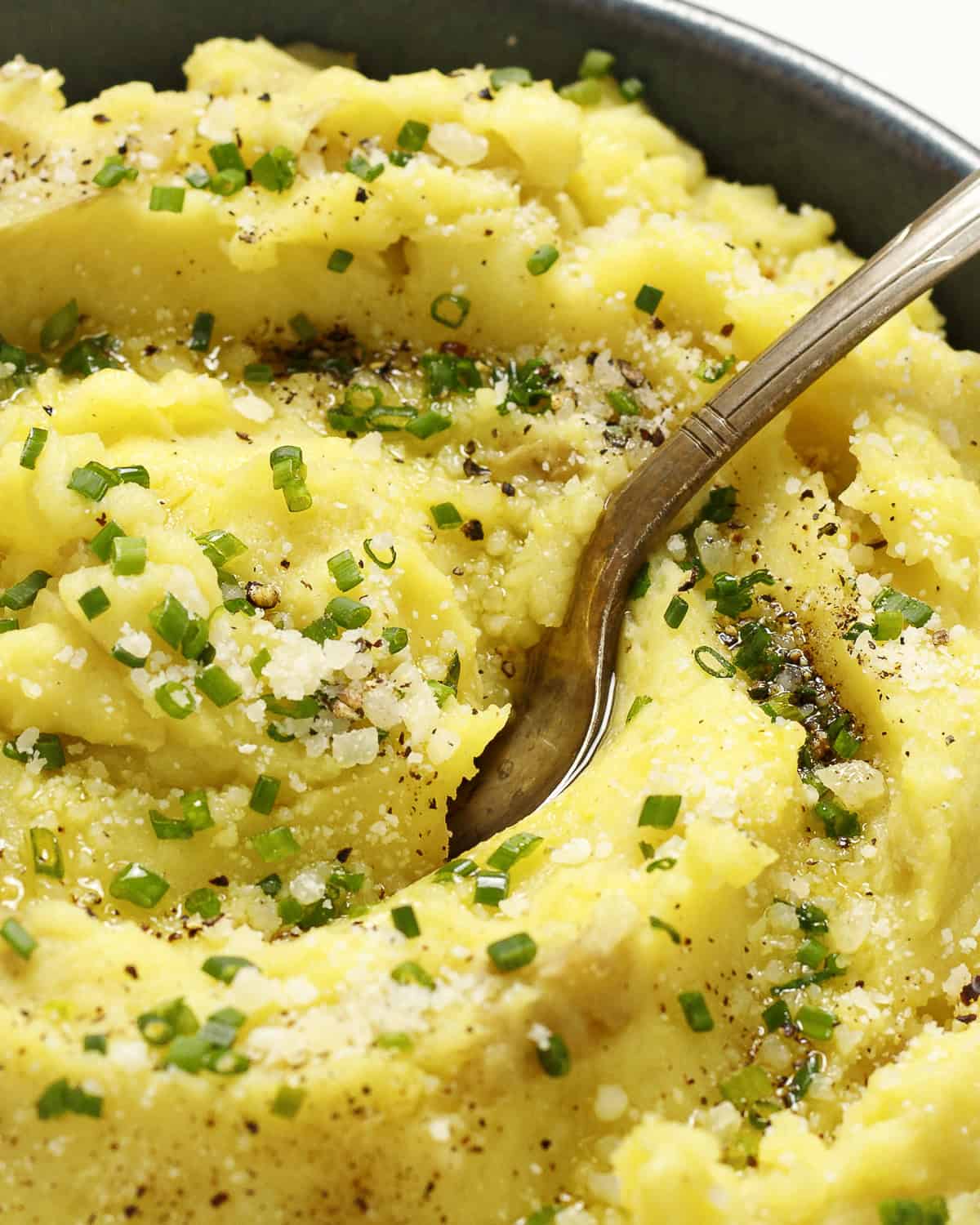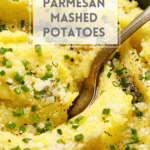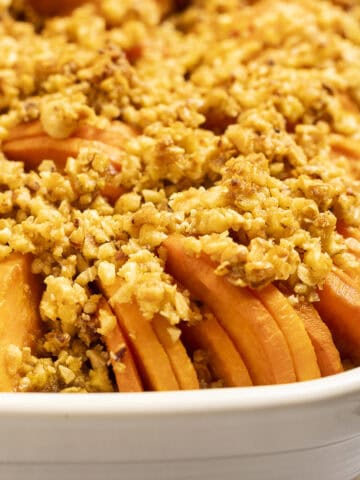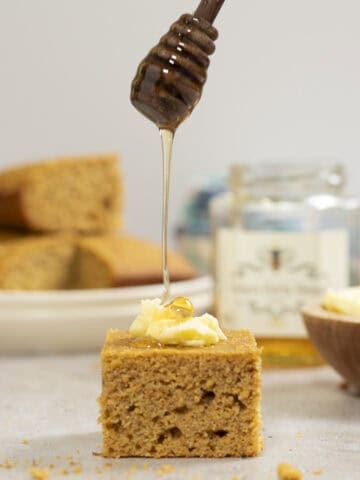I am a huge sucker for mashed potatoes. Serve me turkey and gravy, beef stew, meatballs, short ribs, or what have you over a bed of fluffy mashed potatoes and I’ll be your friend forever. But, in the interest of meeting my (currently fictional) future grandchildren, I’ve mostly given up the buttery, creamy, dreamy mashed potatoes of my carefree youth. In their place, I am surprised—and happy—to report that I am currently enjoying these healthier olive oil and Parmesan mashed potatoes.

You may think of mashed potatoes as a special occasion dish. They certainly have their place as a Thanksgiving side dish or a decadent accompaniment to prime rib at Christmas. They are also one of my ultimate comfort foods, second only to macaroni and cheese (with crispy truffled breadcrumbs, of course). I personally like to indulge more than twice a year.
But since I’ve been thinking about how to get more comfort foods into my life without compromising my health, I got a wild hair one day and decided to try using olive oil instead of butter in mash potatoes. The results were not just acceptable, they were shockingly pretty great! And my family said nothing during that dinner about the mashed potatoes tasting different, which was how I knew the idea had potential.
But can mashed potatoes really be healthy?
Potatoes get a bad reputation not from their nutritional profile but from how they are prepared. The majority of potatoes consumed in the United States are deep fried and served as French fries, potato chips, and the like. They've also taken a hit from the popularity of low-carb and no-carb diets, which I don't personally ascribe to.
Potatoes are fairly high in carbohydrates, but they are also high in fiber, which helps your body manage the moderate rise in blood sugar caused by the carb intake. They contain vitamins, minerals, and a whole host of beneficial micronutrients. In this healthier mashed potato recipe, you'll also get the health benefits of extra virgin olive oil, which can hardly be overstated.
Like many things, I wouldn't call mashed potatoes a "health food," but they can be a healthier choice when you're craving something comforting. It's not a bad compromise if you are looking for healthier mashed potatoes for Thanksgiving or as an accompaniment to my muffin pan turkey meatloaf.
Ingredients and substitutions

Yukon Gold potatoes: I've mostly switched to thin-skinned yellow potatoes (such as Yukon Golds) for mashed potatoes: they are plenty creamy, and they hold longer and reheat better than russets. They also don't need to be peeled...a major advantage in my book.
Kosher salt: I test my recipes with Morton's kosher salt. If using table salt, cut the amount in half. Diamond Knot kosher salt users may need slightly more than the recipe calls for, be sure to taste and adjust your seasoning accordingly.
Extra virgin olive oil: I love Graza extra virgin olive oils, and for this recipe I used their "Sizzle" extra virgin olive oil. Sizzle EVOO is produced from fully ripened single-origin olives in Spain. It has a smooth, mellow taste. For a more pronounced olive oil flavor and more antioxidant power, use a stronger olive oil like Graza's "drizzle" EVOO, made from from olives picked earlier in the season.
Chicken or turkey broth: You can use homemade or low-sodium prepared chicken broth, turkey broth, or vegetable broth. You can also use some of the water you boiled the potatoes in. I like to use homemade turkey broth, which I stockpile after Thanksgiving.
White pepper: I prefer white pepper in mashed potatoes simply for aesthetic purposes. Black pepper is fine if that's what you have on hand.
Parmesan cheese: Please, please, please, please grate your own Parmesan cheese. I promise it's actually more cost-effective, and it won't clump as it melts into your potatoes. You can substitute any of the Italian hard cheeses, including Asiago or Pecorino. Gouda would also be delicious.
Optional garnishes: chopped parsley, chopped chives, shaved Parmesan, and/or a drizzle of olive oil.

FAQ: Mashed potatoes
Absolutely! In fact, because these healthier mashed potatoes are made with Yukon Golds, and without butter and cream, they reheat better than their more decadent cousins. I like to reheat mine in the microwave, with a damp paper towel over the top. If they are cold, cook them at 50% power for 5 to 10 minutes, stirring after the first two minutes, then every minute thereafter. If the potatoes seem dry, mix in a little hot broth.
Plan for about ½ pound of potatoes per person, which should make enough for everyone with little or no leftovers. For Thanksgiving mashed potatoes, I plan a little more, because Thanksgiving leftovers are awesome.
I used to mash my potatoes with a hand mixer, but after too many batches of gluey potatoes, I try to minimize my use of the mixer. If I'm making mashed potatoes with peeled potatoes (which is rare), I use a potato ricer. Usually, though, I mash my potatoes with a traditional masher or one of these meat chopper tools (which happens to also work great for mashing avocado). If my potatoes are a little lumpy, I finish them off quickly with the hand mixer.

Tips for the best Parmesan mashed potatoes
Start your potatoes in cold water. This helps the potatoes cook all the way through to the middle without overcooking the outside.
Use fresh olive oil. Olive oil can turn rancid, and that flavor will really stand out in this mashed potato recipe. Make sure your olive oil has been harvested in the last 12 months and properly stored in a cool, dark place. Always smell your olive oil regularly and discard it if it starts to smell bitter or "off."
Don't skip heating up your broth. This will keep the potatoes hot and help melt and incorporate the Parmesan cheese.
Don't overmix if you are using your hand mixer. It is possible to overwork mashed potatoes, making them stiff and gluey. While this is a bigger problem with starchier russets, it's best not to chance it. I minimize processing time by mashing my potatoes with a masher first, folding in the additional ingredients with a spatula or spoon, and then finishing them off with my hand mixer only if needed.

The perfect meal: meatloaf and mashed potatoes
Pair these Parmesan mashed potatoes with my muffin pan turkey meatloaf and apple and asiago salad with maple-Dijon vinaigrette for a delicious and crowd-pleasing weeknight meal!
Prep ahead, reheating, and storage
These potatoes can be made several hours ahead of dinner and reheated in the microwave. Cover with a damp paper towel and cook at 50% power for 5-10 minutes, stirring well every minute after the first two. If your potatoes seem dry, mix in some hot broth.
Refrigerate leftovers in an airtight container for up to four days.
Did you make this recipe?
Did you make these Parmesan mashed potatoes? I'd love to hear how they turned out for you! And don’t forget to save and share this recipe by pinning it to Pinterest , saving it to Samsung Food (formerly Whisk) or sharing on Instagram or Facebook.
Parmesan Mashed Potatoes with Olive Oil
Equipment
- Knife and cutting board
- Large saucepan
- Measuring cups and spoons
- Potato ricer or masher
- Hand mixer -optional
Ingredients
- 2 pounds Yukon Gold or other thin-skinned potatoes
- 2 teaspoons kosher salt
- ⅓ cup extra virgin olive oil
- 1 cup low-sodium chicken broth
- ½ teaspoon kosher salt
- ⅓ cup grated Parmesan cheese -plus more to taste
- Optional garnishes: chives, ground black pepper, extra Parmesan cheese, chopped parsley
Instructions
- Wash the potatoes and cut them into chunks. Add to a large saucepan and cover with cool water.2 pounds Yukon Gold or other thin-skinned potatoes
- Set the pan over medium-high heat and bring to a boil. Add the 2 teaspoons of salt and boil for 12-15 minutes or until the potatoes are fork-tender.2 teaspoons kosher salt
- Drain the potatoes, and allow them to sit in the pot for a few minutes while excess moisture evaporates.
- Add the chicken broth to a heatproof bowl and place it in the microwave on high for 45-60 seconds, or until hot.1 cup low-sodium chicken broth
- Mash the potatoes well with a hand masher. Switch to a spatula or spoon, and fold in the olive oil, then gradually add half of the hot broth. Add more as needed, a couple of tablespoons at a time, until the potatoes are soft and creamy. You may not need all of the broth.⅓ cup extra virgin olive oil
- Mix in the ½ teaspoon salt and ½ cup of Parmesan cheese. If your potatoes are lumpy, you can switch to a hand mixer or back to the masher, just be careful not to overwork them or they may become chalky or gluey.½ teaspoon kosher salt, ⅓ cup grated Parmesan cheese
- Taste the potatoes and add more salt or Parmesan cheese to your taste. If the Parmesan doesn't seem to be melting into the potatoes, put them back on the stove over low heat and allow them to get piping hot again. Stir them every 3-4 minutes while heating (and more often toward the end).
- Transfer to a serving bowl and add garnish (if using), such as more Parmesan, chopped chives, or parsley.Optional garnishes: chives, ground black pepper, extra Parmesan cheese, chopped parsley
Notes
Need more servings?
To adjust a recipe for more or fewer servings, hover your cursor over the number servings on the recipe card. This will bring up a slider that you can move to the number of servings you want to make.
Nutrition*
*All nutritional values are estimates only. They are calculated by an online resource.








Erica says
SOO YUM! and easy!
Tom says
Very tasty
Marie says
Looks absolutely delicious!